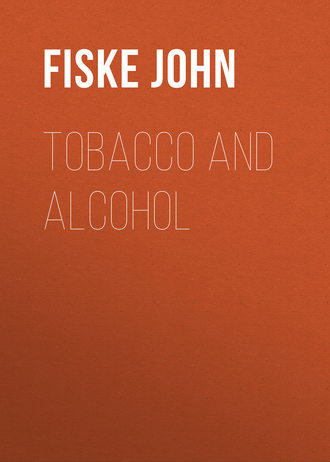 полная версия
полная версияTobacco and Alcohol
Few persons who have not been specially educated in science have ever learned this great lesson of Materia Medica, "that everything depends on the size of the dose." It is not merely that a small dose will often produce effects differing in degree from those produced by a large dose; nor is it merely that the small dose will often produce an effect differing in kind from that of the large dose; but it is that the small dose will often produce effects diametrically opposite and antagonistic to those of the large dose. The small dose may even serve as a partial antidote to the large dose. The adage concerning the hair of the dog that has bitten us, embodies the empirical wisdom of our ancestors on this subject. Especially is this true of all the substances classed as narcotics. In doses of a certain size, they, one and all, produce effects exactly the reverse of narcotic. If anything is entitled to be called a deadly narcotic poison, it is strychnia, which, by paralyzing the spinal cord, induces tetanic convulsions: yet minute doses of strychnia have been used with signal success in the cure of hemiplegic paralysis. In teething children, the pressure upon the dental branches of the trigeminal nerve sometimes causes an irritation so great as partly to paralyze the medulla, inducing clonic convulsions, and perhaps death by interference with the heart's action.7 In these cases, alcohol has been frequently used with notable efficacy, averting as it does the paralysis of the medulla. Epileptic fits, choreic convulsions, and muscular spasms – such as colic, and spasmodic asthma – are also often relieved by the tonic or anti-paralytic action of alcohol. And how often has the temperate smoker, after some occasion of distressing excitement, his limbs and viscera trembling, his nerves "all unstrung," or incipiently paralyzed, – how often has the temperate smoker found his whole system soothed and quieted, and the steadiness of his nerves restored, by a single pipe of tobacco! That this is due to its action as a counteracter of paralysis is shown by the fact that tobacco has been successfully used in tetanus,8 in spasm of rima glottidis,9 in spasmodic asthma,10 and in epilepsy.11 For these phenomena physiology has but one explanation. They are due to the fact that narcotics, in small doses, either nourish, or facilitate the normal nutrition of the nervous system. They restore its equilibrium, enabling it, with diminished effort, to discharge its natural functions. And anything which performs this office is, in modern physiology, called a stimulant.
Here then we have obtained an important amendment of our notion of a narcotic. A narcotic is a substance which, taken in the requisite dose, causes paralysis. But we have seen that by diminishing the dose we at last reach a point where the narcotic entirely ceases to act as a narcotic and becomes a stimulant. What then is a stimulant? There is a prejudice afloat which interferes with the proper apprehension of this word. People call alcohol, indiscriminately, a stimulant; and when a man gets drunk, he is incorrectly said to be stimulating himself; stimulants are therefore looked at askance, as things which demoralize. The reader is already in a position to know better than this. He sees already that it is not stimulus but narcosis which is ruining the drunkard. Nevertheless, that he may understand thoroughly what a stimulant is, we must give further explanation and illustration.
Food and stimulus are the two great, equally essential factors or co-efficients in the process of nutrition. We mean by this, that in order to nourish your system and make good its daily waste, you need both food and stimulus. You must have both, or you cannot support life. Day by day, in every act of life, be it in the acts of working and thinking which go on consciously, or be it in the acts of digestion and respiration which go on unconsciously, in the mere keeping ourselves alive, we are continually using up and rendering worthless the materials of which our bodies are composed. We use up tissue as an engine uses up fuel; and we therefore need constant coaling. Tissue once used is no better than ashes; it must be excreted, and food must be taken to form new tissue. Now the wonderful process by which digested food is taken up from the blood by the tissues – each tissue taking just what will serve it and no more, muscle-making stuff to muscle, bone-making stuff to bone, nerve-making stuff to nerve – is called assimilation, nutrition, or repair. It is according as waste or repair predominates that we are feeble or strong, useless or efficient. When repair is greatly in excess, as it usually is in childhood and youth, we grow. When waste is greatly in excess, we die of consumption, gangrene, or starvation. When the daily repair slightly outweighs the daily waste, we are healthy and vigorous. When the daily repair is not quite enough to replace the daily waste, we are feeble, easily wearied, and liable to be assailed by some illness.
Now, in order to carry on this great process of nutrition, we have said that food and stimulus are equally indispensable. We must have food or we can have nothing to assimilate; but we must also have stimulus, or no assimilation will take place. The unstimulated tissue will not assimilate food. The nutritive material rushes by it, unsought for and unappropriated, and no repair takes place. There are some people whom no amount of eating will build up: what they need is not more food, but more nerve stimulus; they doubtless eat already more than their tissues are able to assimilate. In pulmonary consumption, the chief monster which we have to fight against is impaired nutrition, the tubercles being only a secondary and derivative symptom.12 The problem before us, in dealing with consumption, is to improve nutrition, to make the tissues assimilate food. And to this end we prescribe, for example, whisky and milk – a food which easily reaches the tissues, and a stimulant which urges them to take up the food sent to them. We define, therefore, a stimulant as any substance which, brought to bear in proper quantities upon the nervous system, facilitates nutrition.
At the head of all stimulants stands oxygen, concerning which, for further illustration, we shall quote the following passage from Dr. Anstie:
"It needs but a glance at the vital condition of different populations in any country to arrive at a tolerably correct idea of the virtues of oxygen as a promoter of health and a curer of disease. If we compare the physical condition of the inhabitants of a London alley, an agricultural village, and a breezy sea-side hamlet, we shall recognize the truth of the description which assigns to it the same therapeutic action as is exercised by drugs, to which the name of stimulant seems more naturally applicable than to such a familiar agent as one which we are constantly breathing in the common air. A child that has been bred in a London cellar may be taken to possess a constitution which is a type of all the evil tendencies which our stimulants are intended to obviate… It is highly suggestive to find that that very same quiet and perfect action of the vital functions, without undue waste, without pain, and without excessive material growth, is precisely what we produce, when we produce any useful effect, by the administration of stimulants, though, as might be expected, our artificial means are weak and uncertain in their operation, compared with the great natural stimulus of life."13
Stimulus implies no undue exaltation of the activity of any part of the organism. In complete health all parts of the body should work together in unhindered co-operation. Any undue exaltation of a particular function – excessive brain-action, excessive muscular-nutrition, excessive deposit of fat – is a symptom of lowered life, in which the co-ordinating control of the whole system over its several parts is diminished. Stimulus, on the other hand, implies an increase of the co-ordinating and controlling power. Dr. Anstie therefore recommends that the word "overstimulation" be disused, as unphilosophical and self-contradictory.
In yet one further particular, current notions need to be rectified before we can proceed. In no case is the action of a stimulant followed by a depressive reaction. This seems at first like a paradox. Physiologists have in times past maintained the contrary; and some have even ventured to apply to the phænomena of stimulation the dynamic law that "action and reaction are equal and opposite." But in physiology we shall not be helped much by the theorems of mechanics. In no case is the stimulus followed by any other "recoil" than that which is implied in the mere gradual cessation of its action, just as in the case of food which has been eaten, assimilated, and used up. We quote the following from Dr. Anstie: – "We often hear the effects of strong irritation of the skin, or the mucous surfaces, quoted as an example of the way in which action and reaction follow each other. The immediate effect of such treatment (it is said) is to quicken the circulation and improve the vital condition of the part, but its ultimate result is a complete stagnation of the vital activities in the irritated tissues. The real explanation of the matter is, however, very different. Mild stimulation of the skin (as by friction, warm liniments, &c.) has no tendency to produce subsequent depression; nor has mild stimulation of the mucous membranes (as by the mustard we eat with our roast beef). But the application of an irritant strong enough to produce a morbid depression at all, produces it from the first. Thus the cantharidine of a blister has no sooner become absorbed through the epidermis than it at once deprives a certain area of tissue of its vitality to a considerable extent, as is explained by the researches of Mr. Lister… Here is no stimulation first and depressive recoil afterward, but unmitigated depression from the first."14 "What has been commonly spoken of as the recoil from the stimulant action of a true narcotic is, in fact, simply the advent of narcosis owing to a large impregnation of the blood with the agent after the occurrence of stimulation, owing to a small one. Thus a man drinking four ounces or six ounces of brandy gradually, has not in reality taken a truly narcotic dose till perhaps half the evening has worn away; previously to that he has not been 'indulging in narcotism' at all; nor, had he stopped then, would any after depression have followed, for he might have taken no more than two ounces of brandy, equal perhaps to one ounce of alcohol. But he chose to swallow the extra two ounces or four ounces, thus impregnating his blood with a narcotic mixture capable of acting upon nervous tissue so as to render it incapable of performing its proper functions. The narcosis has no relation to the stimulation but one of accidental sequence. This is proved by the fact that in cases where a narcotic dose is absorbed with great rapidity, no signs of preliminary stimulation occur."15
This disposes of the popular objection to stimulants – based upon the long-exploded theories of vitalistic physiology16 – that every stimulus is followed by a reaction. It is seen that when a man feels ill and depressed after the use of alcohol or tobacco, it is because he has not stimulated but narcotized himself. We challenge any person, not hopelessly dyspeptic, to produce from his own experience any genuine instance of physical or mental depression as the result of a half-pint of pure wine taken with his dinner,17 or of one or two pipes of mild tobacco smoked after it.
Let us not, however, indulge in sweeping statements. We have expressed ourselves with caution, but a still further limitation needs to be made. There are a few persons who are never stimulated, but always poisonously depressed, by certain particular narcotics. There are a few persons – ourselves among the number – in whom a very temperate dose of coffee will often give rise to well-defined symptoms of narcosis. There are others in whom even the smallest quantity of alcoholic liquor will produce giddiness and flushing of the face. And there are still others upon whom tobacco, no matter how minute the dose, acts as a narcotic poison. But such cases are extremely rare; and it is needless to urge that such persons should conscientiously refrain, once and always, from the use of the narcotic which thus injuriously affects them. Our friendly challenge, above given, is addressed to the vast majority of people; and thus limited, it may be allowed to stand.
We have now defined a narcotic; we have seen that narcotics, in certain doses, will act as stimulants, and we have defined a stimulant. Until one's ideas upon these points are rendered precise, there is little hope of understanding the ordinary healthy action either of tobacco or of alcohol. But the reader who has followed us thus far will find himself sufficiently prepared for the special inquiry into the stimulant effects of these substances. Confining ourselves, for the present, to tobacco, we shall find that by assisting the nutritive reparatory process, it conforms throughout to the definition of a true stimulant.
What do we do to ourselves when we smoke a cigar or pipe? In the first place, we stimulate, or increase the normal molecular activity of, the sympathetic system of nerves. By so doing we slightly increase the secretion of saliva, and of the gastric,18 pancreatic, and intestinal juices. We accomplish these all-important secretory actions with a smaller discharge of nerve force: we economize nerve force in digestion. And by this we mean to say that we perform the work of digesting food just as well as before, and still have more of the co-ordinating and controlling nerve-power left with which to perform the other functions of life. Thus at the outset tobacco exhibits itself as an economizer of life. Such is the inevitable inference from its stimulant action on the sympathetic. From the distribution of the sympathetic fibres, we deem it a fair inference that the bile-secreting function of the liver is also facilitated; but of this there is less direct evidence.19 We can now understand why a pipe or cigar dissipates the feeling of heaviness ensuing upon a dinner, or other hearty meal; and when we recollect how instant is the relief, we can form some notion of the amount of nerve-force which is thus liberated from the task of digestion. We are thus also reminded of the hygienic rule that smoking must be done after eating, and not, in ordinary cases, upon an empty stomach. If we smoke when the stomach is empty and quiescent, the stimulated secretion of the alimentary juices is physiologically wasteful; and, moreover, the much more rapid absorption of nicotine by the blood-vessels increases the liability to narcotic effects. It is upon this very principle that the same amount of wine may stimulate at dinner, but narcotize when taken in the forenoon.
Thus far we find tobacco to be a friend and not an enemy. Now, in the second place, when we smoke, we stimulate the medulla oblongata, and through this we send a wave of stimulus down the pneumogastric nerve, and this makes the heart's action easier. One of the earliest stimulant effects of tobacco to be noted is the slightly increased frequency and strength of the pulse.20 A narcotic dose produces quite the opposite effect. It begins by greatly increasing the frequency while diminishing the strength, so as to make a feeble, fluttering pulse; and it ends by reducing the frequency likewise. After some years of temperate smoking we accidentally felt, for the first time, the narcotic effects of tobacco. Eight or nine cigars (large twenty-cent ones, such as Mr. Parton delights in the recollection of) smoked consecutively while taking a cold midnight drive, were followed by unmistakable symptoms of narcosis. Along with the muscular tremour of the stomach, much more acute than that of ordinary nausea, it was observed that the pulse, normally strong and regular at 80, had been reduced to 69, and was feeble and flickering. Similar, no doubt, are the symptoms which ordinarily worry the novice, in whom acute narcosis is liable to result from the lack of skill with which he draws in too large a quantity of the narcotic constituents of his cigar. The effects of tobacco, through the medulla and pneumogastric, upon the heart, are among its most notable effects. A dose of pure nicotine stops the heart instantly, a narcotic dose interferes with its action, but a stimulant dose facilitates it. The same results are attainable by means of electricity.21 A powerful current through the pneumogastric of a frog or rabbit will stop the heart, a less powerful current will slacken it, a slight current will somewhat accelerate it. Emotional effects are precisely similar. Sudden overwhelming joy or sorrow may operate as a true narcotic, arresting the heart's contractions, while steady diffusive pleasure always facilitates them.
The stimulant action of tobacco upon the heart is precisely the same as that of sunlight, which, by inciting the nervous expanse of the retina, indirectly strengthens and accelerates the pulse. So far as the circulation is concerned, there is no difference between the two. The one stimulus may indeed be popularly called "natural," while the other is called "artificial," but such a distinction is physiologically meaningless. The molecular action is the same and the consequences to the organism are the same in both cases. The heart's normal action being facilitated, the blood is poured more vigorously through every artery, every vein, and every network of capillaries. Every tissue receives with greater promptness its quota of assimilable nutriment. And, the web-like plexuses of nerve-fibres distributed throughout the tissues being simultaneously stimulated, the work of nutrition goes on with enhanced vigour and efficacy. Nor is it possible for the excreting organs to escape the influence. Lungs, skin, and kidneys must be alike incited; and the removal from the blood of noxious disintegrated matters, the products of organic waste, is thus hastened.
So much is to be inferred from the stimulant action of tobacco upon the medulla. Of all this complicated benefit, the brain receives perhaps the largest share. The brain receives one-fifth, or according to some authorities one-third, of all the blood that is pumped from the heart. More than any other organ it demands for its due nutrition a prompt supply of arterial blood; and more than any other organ it partakes of the advantages resulting from vigorous circulation.
The stimulant action of tobacco upon the spinal cord and the cerebral hemispheres is less conspicuous. Yet even here its familiar influence in stilling nervous tremour and allaying nocturnal wakefulness is good testimony to its essentially beneficent character. Wakefulness and tremour are alike symptoms of diminished vitality; and the agent which removes them is not to be called, as Mr. Parton in his mediæval language calls it, "hostile to the vital principle."
So much for the net results of the stimulant action of tobacco. So far we have travelled on firm ground, and we have not found much to countenance Mr. Parton's view of the subject. But now some curious inquirer may ask, what is this stimulant action? What is the physiological expression for it, reduced to its lowest terms? Here we must keep still, or else venture upon ground that is very unfamiliar and somewhat hypothetical. There is no help for it; for we cannot yet give the physiological expression for unstimulated nervous action, reduced to its lowest terms. We know what kind of work nerves perform, but how they perform it we can as yet only guess. Nor, as far as the practical bearings of our subject are concerned, does it matter whether this abstruse point be settled or not. Still, even upon this dark subject recent research has thrown some gleams of light. A nerve-centre is a place where force is liberated by the lapse of the chemically-unstable nerve-molecules into a state of relative stability.22 To raise them to their previous unstable state, thereby enabling them to fall again and liberate more force, is the function of food. Now our own hypothesis is, that tobacco and other narcotic stimulants enable force to be liberated by the isomeric transformation of the highly complex nerve-molecules, which retain in the process their state of relative instability, and are thus left competent to send forth a second discharge of force without the aid of food.
In support of this hypothesis we have the well-known fact that tobacco, like tea, coffee, alcohol and coca, universally retards organic waste. These substances effect this result in all the tissues, and more especially may they be expected to accomplish it in nervous tissue, where their action is so conspicuously manifest.
Thus is explained the familiar action of narcotic-stimulants in relieving weariness. Weariness, in its origin, is either muscular or nervous. It implies a diminution – owing to failing nutrition – of the total amount of contractile or of nervous force in the organism; and it shows that the weary person must either go to sleep or eat something. Now every one knows how a cup of tea, a glass of wine, or a cigar, dispels weariness. Of the three agents, tobacco is perhaps the most efficacious, and it can produce its effect in only one way – namely, by economizing nervous force, and arresting the disintegration of tissue.
Thus also is explained the marvellous food-action of these substances. Tea and coffee enable a man to live on less beefsteak. The Peruvian mountaineer, chewing his coca-leaf, accomplishes incredibly long tramps without stopping to eat. And every hardy soldier, in spite of Mr. Parton, has that within him which tells him that he can better endure severe marches and wearisome picket-service if he now and then lights his pipe. The personal experience of any one man is, we are aware, not always conclusive; but our own, so far as it goes, bears out the general conclusion. It was when we were engaged in severe daily mental labour, that we first conceived the idea of employing tobacco as a means of husbanding our resources. Narcosis being steadily avoided, the experiment was completely, even unexpectedly, successful. Not only was the daily fatigue sensibly diminished, but the recurrent periods of headache, gloom, and nervous depression were absolutely and finally done away with. That this result was due to improved nutrition was shown by the fact that, during the first three months after the habit of smoking was adopted, the average weight of the body was increased by twenty-four pounds – an increase which has been permanent. No other dietetic or hygienic change was made at the time, by which the direct effects of the tobacco might have been complicated and obscured.
The statement that smoking increases the average weight of the body23 is not, however, universally true. We have here an excellent illustration of the impracticability of laying down sweeping rules in physiology. Many persons find their weight notably diminished by the use of tobacco; and we frequently hear it said that smoking will not do for thin people, although for those who are fleshy it may not be injurious. In this there is a very natural but very gross confusion of ideas, which a little reflection upon the subject will readily clear up. It is true that moderate smoking sometimes increases and sometimes diminishes the weight; and it is no less true that in each case the result is the index of heightened nutrition! This seems, of course, paradoxical. But physiology, quite as much as astronomy, is a science which is constantly obliging us to reconsider and rectify our crude off-hand conceptions.
It is by no means true that increase of the tissues in bulk and density is always a sign of improved health. We are accustomed to congratulate each other upon looking plump and rosy. But too much rosiness may be a symptom of ill-health; and, similarly with plumpness, there is a point beyond which obesity is a mere weariness to the spirit. Nor does a person need to become as rotund as Wouter Van Twiller in order to reach and pass this point. Many persons, who are not actually corpulent, would lose weight if their nutrition could be improved. And the explanation is quite simple.
Normal nutrition is not merely the repair of tissue: it is the repair of all the tissues in the body in due proportion. This is a very essential qualification. Fibrous and areolar tissue, muscle, nerve, and fat are daily and hourly wasting in various degrees; and the repair, whether great or small, must be nicely proportioned to the waste in each tissue. If a pound is added to the weight of the body, it makes all the difference in the world whether one ounce is muscle, another ounce nerve, a third ounce fat, and so on, or whether the whole pound is fat. When one tissue gets more than its fair share, the chances are that all the others must go a-begging. The co-ordinating, controlling power of the organism over its several parts is diminished, – which is the same as saying that nutrition is impaired. Evidence of this soon appears in the circumstance that the deposit of adipose tissue is no longer confined to the proper places. Fat begins to accumulate all over the body, in localities where little or no fat is wanted, and notably about the stomach and diaphragm, causing laborious movement of the thorax and wheezing respiration. When a man gets into this state, it is a sign that the ratio between the waste and the repair of his tissues has become seriously dislocated. You can relieve him of his fat only by improving his nutrition. The German who drinks his forty glasses of lager bier per diem is said to be bloated; and we have heard it gravely surmised that the ale, getting into his system, swells him up – as if the human body were a sort of bladder or balloon! The explanation is not quite so simple. But it is easy to see how this immense quantity of liquid, continually loading the stomach and intestines, and entailing extra labour upon all the excreting organs, should so damage the assimilative powers as to occasion an excessive deposit of coarse fat and of flabby, imperfectly-elaborated connective tissue, over the entire surface of the body. And the state of chronic, though mild, narcosis in which the guzzler keeps himself, by still further injuring his reparative powers, contributes to the general result.









